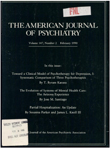Drugs and the DST: need for a reappraisal
Abstract
It has generally been assumed that psychotropic drugs do not influence results on the dexamethasone suppression test (DST), except in some specific situations. Yet they directly affect the activity of many neurotransmitter systems, which in turn regulate hypothalamic-pituitary- adrenal (HPA) axis functioning. Several reports have shown correlations between the intake of or recent withdrawal from psychoactive substances and changes in DST results. A review of the DST literature reveals that these effects have not been controlled in most DST studies. It is therefore possible that the consequences of intake of psychotropic agents may have contributed to the debate surrounding the DST by producing unappreciated spurious DST results.
Access content
To read the fulltext, please use one of the options below to sign in or purchase access.- Personal login
- Institutional Login
- Sign in via OpenAthens
- Register for access
-
Please login/register if you wish to pair your device and check access availability.
Not a subscriber?
PsychiatryOnline subscription options offer access to the DSM-5 library, books, journals, CME, and patient resources. This all-in-one virtual library provides psychiatrists and mental health professionals with key resources for diagnosis, treatment, research, and professional development.
Need more help? PsychiatryOnline Customer Service may be reached by emailing [email protected] or by calling 800-368-5777 (in the U.S.) or 703-907-7322 (outside the U.S.).



